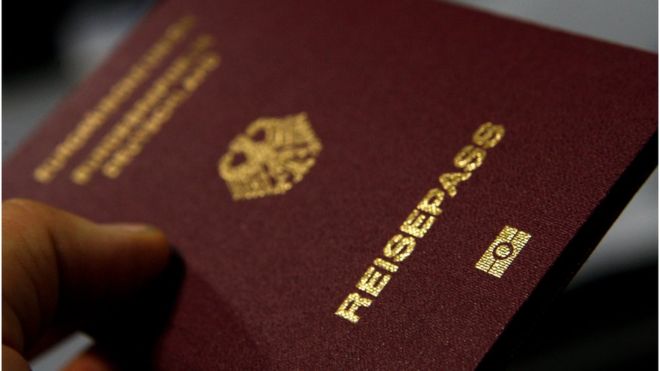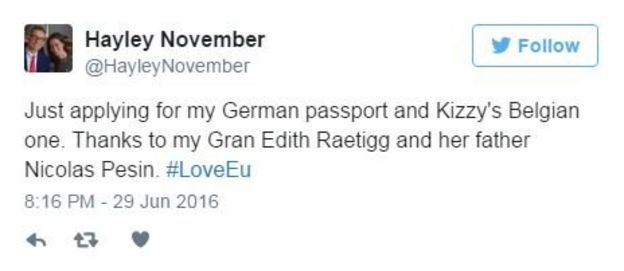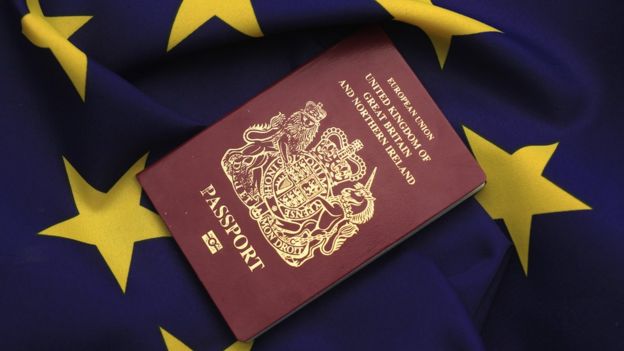- 4 July 2016
- EU Referendum
 GETTY IMAGES
GETTY IMAGES
It is more than a week since Britain voted to leave the European Union, and there is still little certainty regarding the future status of EU citizens currently living in the UK, or of British people living elsewhere in the EU.
While many British citizens are happy to potentially wave goodbye to freedom of movement within the EU, some Britons would like to hold on to the opportunity to live and work in the other 27 countries that make up the union.
At the weekend, German Vice-Chancellor Sigmar Gabriel said the remaining members should not "pull up the drawbridge" for young Britons, who largely voted to remain, and so should consider offering dual nationality to young British citizens "who live in Germany, Italy or France, so that they can remain EU citizens in this country".
Mr Gabriel's comments follow a statement by Italian Prime Minister Matteo Renzi last Tuesday suggesting that EU nations were considering whether British students at universities on the continent could be offered citizenship.
Mr Renzi said he was "sad" for the younger generation of Britons.
In the absence of any concrete information on either plan, what other options are already open to British citizens, of any age, keen to access an EU citizenship after Brexit?
Move to the EU now and later apply for citizenship
The UK remains part of the EU, for now, so freedom of movement still applies. This means a British citizen currently still has full rights to move to any other EU country to work or study, as many have already done.
While it is not clear what will happen to those residents once the UK "brexits", they may well be able to stay, and, in time, apply for citizenship.
For example, residents of Germany can apply for citizenship after eight years - less in some circumstances - as long as they pass an assessment of their German language skills and a naturalisation test, among other criteria.
A spokesman for the German interior ministry told the BBC that, while up-to-date figures were not available, he would not rule out an increase in applications for German nationality from Britons in light of the Brexit vote.
This is because German law requires non-EU citizens to give up their existing nationality when applying for German citizenship - so British citizens are currently able to hold on to their UK passport and get a shiny new German one.
The ministry confirmed that a Briton in this situation would not be deprived of their newly acquired German nationality even if/when the UK subsequently leaves the EU.
Mr Gabriel's SPD - the junior coalition partner in the German government - told the BBC that the vice-chancellor's comments about dual nationality for young Britons referred specifically to Britons living in Germany, so that they would be able to retain their UK citizenship even if applying for German naturalisation in a post-Brexit world.
France and Sweden are among several EU countries which set a shorter period for residents to gain citizenship. Adults must have lived in Sweden for at least five years, children as little as two years, before they can apply for naturalisation (again, other conditions apply).
Dig out the family tree
 TOPICAL PRESS AGENCY
TOPICAL PRESS AGENCY
Grandpa from Galway? Nonna from Napoli? Then you may be entitled to claim a second nationality by descent.
If you have a parent born in another EU country, your route to citizenship may be reasonably clear, but if the link is more distant you need to look in detail at the relevant country's nationality laws.
Ireland in particular allows people with just one Irish grandparent to claim Irish citizenship - and if each generation registers before the birth of the next, it is possible to keep passing the Irishness down the generations, even if you do not live there.
And Italian roots can go back even further, with citizenship being passed from parent to child and no limit on the number of generations. So a single great-grandparent might entitle you to an Italian passport - as long as no-one in the chain has renounced their Italian citizenship, and with the important proviso that citizenship could only be passed on by women after 1948.
Lithuania is another country that potentially allows citizenship for great-grandchildren of its former citizens.
The laws of other countries, including Spain, Poland and Hungary, allow descendants of citizens to claim nationality, though the rules are often complex, and you would have to track down a lot of documents.
If you are descended from Jews or other groups who had to flee persecution, including the Holocaust, you may be eligible under special rules, sometimes called restored citizenship or restitution.
 TWITTER
TWITTER
The German constitution provides for German citizenship for the descendants of former German citizens "who were persecuted on political, racial or religious grounds between 30 January 1933 and 8 May 1945". This mainly applies to German Jews and social democrats and Communists who had to flee the country.
Descendants of Sephardic Jews who were expelled from Spain and Portugal five centuries ago may be able to apply for a Spanish or Portuguese passport more easily under recent legislation - although there are language requirements.
Find love
 REUTERS
REUTERS
Some countries will grant citizenship to the spouse of a passport holder - even if the couple do not live in the country concerned.
Italian law states that "the spouse of an Italian citizen living outside of Italy can apply for Italian citizenship three years after the date of the marriage, or after 18 months if the couple has children".
Portuguese citizenship can also be acquired by declaration after three years of marriage or de facto partnership with a Portuguese citizen.
Most other EU countries do require the non-national spouse to live in the country for a set period - but this period is often less than it would be if they were not married to a citizen of that country.
Note that for Irish citizenship, the spouse or civil partner needs to have lived on the island of Ireland (so Northern Ireland counts) for at least three of the past five years, and to have been married for at least three years.
Invest
 GETTY IMAGES
GETTY IMAGES
Malta and Cyprus are both in the EU, and both offer a fast-track to citizenship for people who are able to invest a significant amount of money.
Maltese citizenship is available to those who invest €1.15m (£965,000; $1.3m) there; the country added a one-year residency requirement after EU pressure. The scheme is aimed at "ultra-high net worth individuals and families worldwide".
The Cypriot government offers citizenship to those who put €5m (£4.2m; $5.6m) into approved investments - this is reduced to just €2.5m for those taking part in a collective investment. Applicants need to have a property in Cyprus but do not need to live there all of the time. Family members are included in the application, which can take as little as three months.
None of the above apply?
 GETTY IMAGES
GETTY IMAGES
Already married, lacking a spare £1m, most exotic ancestor from Sunderland and not able to move abroad anytime soon?
Do not worry - a British passport remains one of the most useful you can have, giving visa-free access to 175 countries, according to a firm which ranks these things.

No comments:
Post a Comment